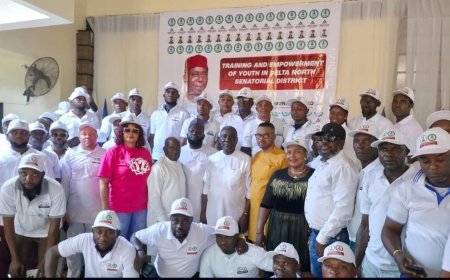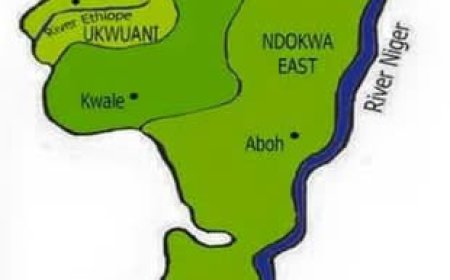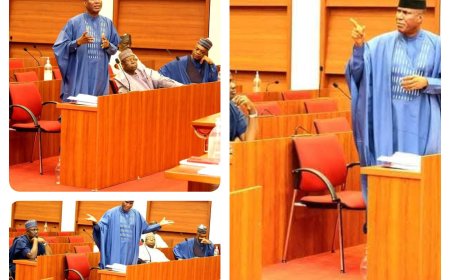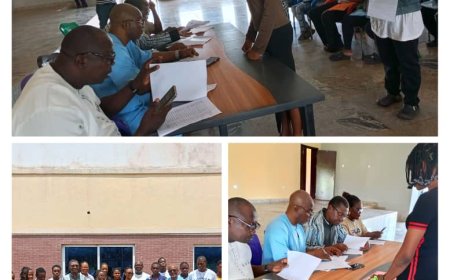THE EFFECTS AND CONSEQUENCES OF MISPLACED PRIORITIES IN THE EXECUTIONS OF FISCAL PROJECTS, VIS-À-VIS GOVERNMENT OF DELTA STATE
Authored by Emmanuel Anazia, 30th July 2025

INTRODUCTION
Government fiscal projects are meant to address the immediate and long-term developmental needs of the people. When properly conceived and executed, they serve as engines of growth, reduce unemployment, improve infrastructure, and elevate the standard of living. However, when fiscal priorities are misplaced—when funds are directed toward projects that do not align with the core needs of the population—the results are often wasteful, counterproductive, and damaging to both the economy and public trust.
In the context of Delta State, a region richly endowed with oil resources yet grappling with underdevelopment, the issue of misplaced fiscal priorities is a recurring theme. Despite substantial revenues, particularly from federal allocations and internal revenue, many Deltans still suffer from poor infrastructure, unemployment, dilapidated health and educational facilities, and a widening gap between government spending and public benefit.
UNDERSTANDING MISPLACED PRIORITIES
Misplaced priorities in governance occur when projects are funded based on political interest, favoritism, or short-term visibility rather than actual developmental value or public need. In such cases, government focuses more on aesthetics or prestige-driven projects while neglecting fundamental sectors such as education, healthcare, job creation, rural development, and security.
In Delta State, numerous instances reveal how projects with little or no socio-economic impact are prioritized over basic needs of the populace, leading to wasted resources and a disenfranchised citizenry.
EFFECTS AND CONSEQUENCES
1. Wastage of Public Funds
Projects that are not well-thought-out or disconnected from the real needs of the people often become abandoned, underutilized, or irrelevant. Examples include construction of lavish government lodges, overhead bridges in rural zones with little traffic, or elaborate events that gulp millions without any lasting impact.
2. Stunted Development and Infrastructure Decay
By allocating funds to unimportant or redundant projects, critical areas like road networks, electricity, and water supply remain underdeveloped. This hampers economic activities, especially in rural and riverine areas, where farmers and traders struggle with poor access to markets.
3. Unemployment and Youth Restiveness
A lack of investment in job-creating sectors such as agriculture, ICT, and technical education leads to soaring unemployment among youths. This contributes to social vices such as cultism, cybercrime, drug abuse, and even militancy, all of which have plagued parts of Delta State.
4. Decline in Health and Educational Standards
Schools without roofs, hospitals without drugs or equipment, and unpaid salaries for workers are common scenarios when budgetary priorities sideline health and education. This erodes human capital development and long-term productivity.
5. Public Distrust and Apathy
When citizens see fiscal waste and insensitivity to their plight, confidence in government erodes. People become disengaged from democratic participation, while corruption thrives under weakened public scrutiny.
6. Increase in Poverty and Inequality
The urban-rural divide widens when urban beautification and elite-centric projects are prioritized over rural electrification, agricultural subsidies, and basic healthcare. This results in deepened poverty among the majority.
DELTA STATE IN FOCUS
Delta State has received billions of naira in federal allocations over the years, yet it continues to struggle with core development indicators. While some administrations have initiated legacy projects, critics argue that many of these projects were not in line with pressing needs. For example, the construction of elaborate state secretariats or event centers in the face of massive youth unemployment and derelict health facilities raises questions about priority-setting.
Also, some projects, though visible, are concentrated in a few urban areas such as Asaba and Warri, leaving vast areas in Ndokwa, Ukwuani, Ika, and other hinterlands untouched.
THE WAY FORWARD
Needs-Based Budgeting: Government must adopt a participatory approach to budgeting by consulting communities and stakeholders on their most pressing needs.
Monitoring and Evaluation: Independent monitoring of fiscal projects should be institutionalized to assess relevance, efficiency, and impact.
Transparency and Accountability: Clear communication of project purposes, costs, and expected outcomes will promote transparency and reduce corruption.
Shift Focus to Productive Sectors: Greater attention should be placed on agriculture, technical education, small-scale enterprises, and innovation-driven sectors to drive long-term growth.
CONCLUSION
Misplaced priorities in the execution of fiscal projects are not just administrative errors—they have real, damaging consequences on people’s lives and the future of the state. In Delta State, where resources are abundant but socio-economic progress remains inconsistent, there is a pressing need for deliberate, people-centered governance. Only through strategic planning, honest leadership, and responsive budgeting can the state break free from the cycle of underdevelopment and harness its full potential.
Authored by Emmanuel Anazia
What's Your Reaction?





















































